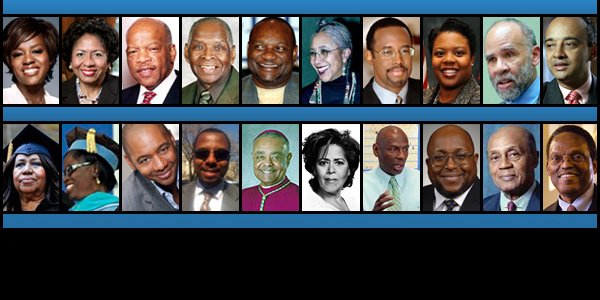 http://www.jbhe.com/2012/06/honorary-degrees-awarded-to-blacks-in-2012-from-the-nations-highest-ranked-universities/
http://www.jbhe.com/2012/06/honorary-degrees-awarded-to-blacks-in-2012-from-the-nations-highest-ranked-universities/
June 26, 2012
This spring
the nation’s 30 highest-ranked national universities awarded 22 honorary
degrees to African Americans and other Black scholars. A year ago, this same
group of universities awarded 21 honorary degrees to Blacks. (Several of the
nation’s highest-ranking universities, including Stanford, Berkeley, UCLA,
Cornell, and the University of Virginia, do not award honorary degrees on a
regular basis, if at all.)
Brown
University and the University of Pennsylvania each awarded honorary degrees to
three Black scholars this spring. Congressman John Lewis of Georgia received
honorary degrees from three high-ranking universities this year.
With the addition of 16 honorary
degrees awarded to Blacks from the nation’s leading liberal arts colleges (See
JBHE post here.), all told the nation’s highest-ranked colleges and
universities awarded 38 honorary degrees to Blacks this spring. This compares
to 34 honorary degrees awarded to Blacks in 2011.
Here
are this year’s honorands from the nation’s highest-ranked universities.
Brown
University
Viola Davis is an actress of the stage, television,
and film. She received an academy award nomination for her role in The Help and has won two
Tony Awards. A native of South Carolina, she grew up in Rhode Island and is a
graduate of Rhode Island College.
Ruth Simmons recently stepped down as president
of Brown University. She has served in that post since 2001. Previously, she
was president of Smith College. Dr. Simmons will remain on the Brown University
faculty.
John Lewis is a U.S. Congressman from Georgia.
Democratic leader in the House Nancy Pelosi has called him “the conscience of
the U.S. Congress.”
Columbia
University
Muhal Richard Abrams is a jazz musician
and composer. A native of Chicago, he taught himself how to play the piano.
Duke
University
Darryl Hunt is the founder of Darryl Hunt Project for
Freedom and Justice, which provides assistance to individuals who have been
wrongfully incarcerated. Hunt was convicted of rape and murder in 1984 and
spent 19 years in prison. New DNA evidence exonerated him in 2004.
Emory
University
Camille Billops is a celebrated sculptor and
printmaker. Together with her husband, she assembled a vast an archive of
African American cultural materials that they have donated to the Robert W.
Woodruff Library at Emory University.
Benjamin Carson is professor of neurosurgery,
oncology, plastic surgery, and pediatrics at the Johns Hopkins School of
Medicine. In 1987 he was the first surgeon to perform a successful separation
of craniopagus twins joined at the back of the head.
Georgetown
University
Kayla Henderson is the chancellor of the
Washington, D.C., public school system. She holds bachelor’s and master’s
degrees from Georgetown University.
John A. Payton, who died earlier this year, was
awarded a posthumous honorary degree. He was a prominent civil rights attorney
who was director-counsel of the NAACP Legal Defense and Education Fund.
Harvard
University
K. Anthony Appiah is the Laurance S.
Rockefeller University Professor Of Philosophy and the University Center for
Human Values at Princeton University. He joined the Princeton faculty in 2002
after previously teaching at Harvard. He holds bachelor’s, master’s, and Ph.D.
degrees from Cambridge University.
John Lewis, the son of sharecroppers, is a veteran of
the civil rights movement having participated in the Freedom Rides, the March
on Washington, and the Bloody Sunday voting rights march in Selma, Alabama.
Princeton
University
Aretha Franklin, the Queen of Soul, recorded her
first album at age 18 and has recorded 223 albums in a career spanning more
than 50 years.
Tufts
University
Cecillia Ibeabuchi, a native of
Nigeria, is clinic manager of Boston Health Care for the Homeless Program’s
busy downtown medical clinic.
University
of North Carolina at Chapel Hill
Branford Marsalis, a jazz musician,
composer, and bandleader, has taught at Michigan State University, San
Francisco State University, and North Carolina Central University.
University
of Notre Dame
Jude Banatte is the director of programming for
Catholic Relief Services in Haiti. He played an instrumental role in recovery
efforts following the 2010 earthquake that devastated Haiti.
Wilton Gregory is archbishop and head of the
Archdiocese of Atlanta. He was educated at Loyola University and St. Mary of
the Lake Seminary.
University
of Pennsylvania
Anna Deavere Smith is an actress,
author, and playwright who brings together art and social commentary to create
a unique form of “documentary theater”.
Geoffrey Canada is president and CEO of the
Harlem’s Children’s Zone, which serves more than 11,000 children in Central
Harlem, providing a comprehensive range of educational, social, and medical
services.
John Lewis organized sit-ins at segregated lunch
counters in Nashville as a student at American Baptist College. In 1963 he was
named chair of the Student Nonviolent Coordinating Committee. In 1981 he was
elected to the city council in Atlanta and has served in the U.S. Congress
since 1987.
Wake
Forest University
Willie E. May is the associate director for
laboratory programs at the National Institute of Standards and Technology.
Washington
University
Donald Suggs is an oral surgeon and publisher of
the St. Louis American,
one of the largest African Americans newspapers in the nation. Born in East
Chicago, Indiana, Dr. Suggs earned a bachelor’s degree and a doctorate of
dental surgery from Indiana University.
Yale
University
William Julius Wilson, one of the
nation’s leading urban sociologists, is the Lewis P. and Linda L. Geyser
University Professor at Harvard University. Before coming to Harvard in 1996 he
taught at the University of Chicago for nearly a quarter century.

Journal of Blacks in Higher Education: Honorary Degrees Awarded to Blacks in 2012 From the Nation’s Highest-Ranked Universities









